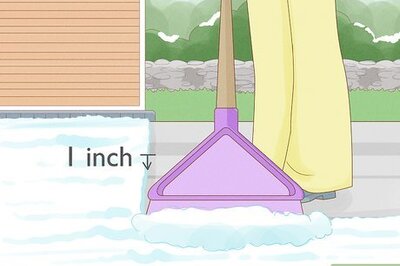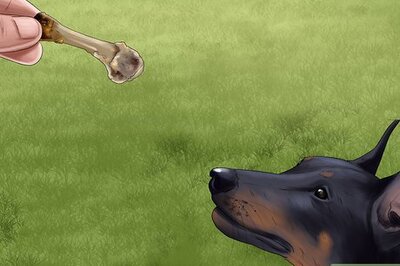
views
Erics: A week after a powerful earthquake in southeast Turkey, survivors roamed the streets past devastated homes, some complaining their families still had no tents with winter closing in.
On Saturday, the official death toll crept up to 582. The town of Ercis was worst hit by the 7.2 magnitude quake, with 455 people killed. The last person dug out of the rubble alive was a 13-year-old boy in the early hours of Friday. He was the 188th person to be rescued. Hopes of finding more were fading.
Deputy Prime Minister Besir Atalay told a news conference in Van on Saturday that search and rescue operations at the last four sites in Ercis would be halted in the evening.
Under fire for a slow response in the early days of the disaster, state authorities have said tents will only be given to families once their home has been deemed uninhabitable, but people are too scared to go back to their cracked walls with multiple aftershocks rattling the region.
"I have a 1-month-old baby and two other children. We are on the street. My baby is going to get sick. My wife needs looking after, she just gave birth. We've got no tents, nowhere to stay," Naci Aydin, a 32-year-old unemployed man told Reuters as he registered at a municipal crisis centre in Van.
"We just want a tent, all these people need somewhere to stay, but we don't get it, we don't receive any aid. I will register here today but I've got no hope."
An official at the centre said volunteers will visit the addresses of people who register to decide how much aid they needed.
Overseeing the relief efforts, Atalay said 35,000 tents had been handed out so far, and there was no shortage. But people have complained distribution was chaotic, tents were looted, and some were sold by profiteers on the black market.
"From now on, we are determining the need for tents according to our nightly visits and not according to citizens demands," Atalay said.
Relief agencies have established tent cities on the edge of a town that was once home to nearly 100,000.
Atalay earlier said the emergency needs for all the affected -- at least in the main urban areas -- would be met by Saturday night, though supplying outlying villages would take longer.
For people still waiting for the state to help they seemed empty words, after spending a sixth bitterly cold night under whatever shelter they had made for themselves, and accusations of mismanagement and unfairness of handing out tents were rife.
"They give tents to supporters of the government party. Village leaders hand out tents to their friends and relatives. Public servants get the best tents," 60-year-old Kahraman Kaya told Reuters, tramping the streets of Ercis with other grim-faced, red-eyed and unshaven men.
The region is predominantly Kurdish, and the government is trying to build bridges with the ethnic minority while fighting a long-running separatist insurgency by Kurdistan Workers Party (PKK) militants, making it particularly sensitive to any accusations of neglect.
Parades and receptions on Saturday for Republic Day, celebrating the formation of the modern Turkish state, were cancelled.
On Saturday, a female suicide bomber killed at least two people and wounded a dozen more in an attack on a tea house close to the offices of the ruling AK Party in Bingol, another town in the mainly Kurdish area.
Freezing temperatures
No official figures were available for the number of people made homeless by the quake. The International Federation of Red Cross and Red Crescent Societies put the number of "affected people" at 50,000.
In Van, a city of 1 million people which suffered less damage, tests were being conducted to ascertain whether the water was drinkable.
Lights were switched back on in some buildings in the centre of Ercis on Friday and a pharmacy, a bank and a computer parts shop re-opened, but there was no running water.
Electricity cables were run to the camps so people could plug in whatever appliance they had salvaged next to the tents.
Food distribution centres are giving out water, nappies, bread, hot soup and pasta in plastic trays, but survivors say their main problem is long-term shelter from the cold.
Nezihe Saglam, 38, fretted for her children as she sat around a small camp fire with other family members who had pitched three tents in a garden.
"We have a stove in the tent but it's freezing at night, and the stoves can't help the freezing temperatures. What if the kids get infections?" she said.
Niyazi Dogac Gucbilek, a health official drafted in to run a mobile hospital near a camp in Ercis of more than 330 tents, said the main task was countering acute respiratory illnesses and blood pressure problems, as winter fast approaches.
"Cold is the biggest problem now. We had many diarrhoea cases in the first few days but now it is down to normal levels," he told Reuters. He said 10 babies had been born there in the past five days, all perfectly healthy.
The United States said on Friday it would join other countries answering Turkey's call for help to supply tents, containers and prefabricated housing.




















Comments
0 comment